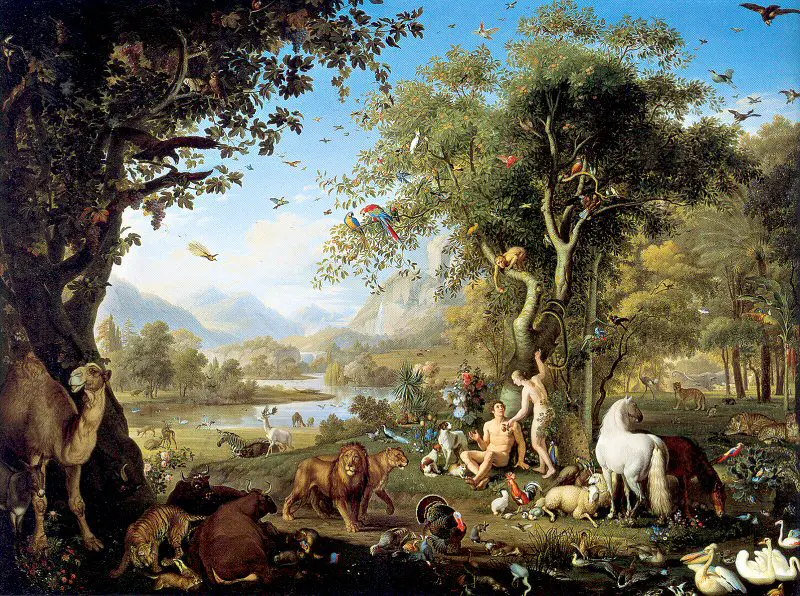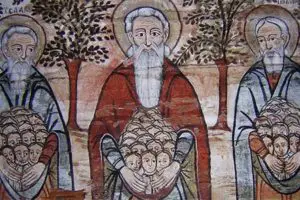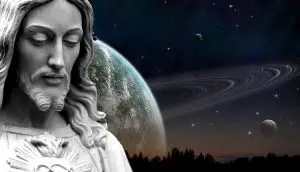When God led the Israelites out of Egyptian captivity, a culture marked by polytheism, He made it known that He was different from all other gods. He was the only true God, and He was one:
Deuteronomy 6:4 (NASB) “Hear, O Israel! The LORD is our God, the LORD is one! (emphasis added)
This passage, known as the Shema (Hebrew for the word hear or listen), became the statement of belief for Jews. Award winning author, Rabbi Reuven Hammer, writes regarding the meaning of this Jewish creed:
Briefly, the first paragraph, Deuteronomy 6:4-9, commands Israel to accept the one and only existing God whose name was revealed to Moses at the burning bush in the four Hebrew letters yod heh vav heh from the root meaning “existence” and to love that God. It is, therefore, a proclamation of monotheism, of belief in one God, creator of all, sovereign of all.[1] (emphasis added)
The Shema encapsulates a truth that is repeatedly emphasized in Scripture: God is one, and there are no other gods besides Him:
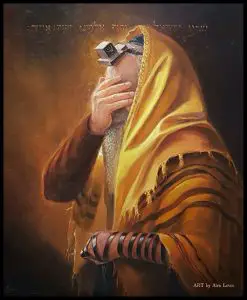
Exodus 8:10 (NASB) Then he said, “Tomorrow.” So he said, “May it be according to your word, that you may know that there is no one like the LORD our God.[2] (emphasis added)
John 5:44 (NASB) [Jesus speaking] “How can you believe, when you receive glory from one another and you do not seek the glory that is from the one and only God? (emphasis added)
Galatians 3:20 (NASB) Now a mediator is not for one party only; whereas God is only one (emphasis added)
God’s uniqueness is emphasized even more powerfully when He declares it Himself:
Isaiah 40:25 (NASB) “To whom then will you liken Me that I would be his equal?” says the Holy One. (emphasis added)
Isaiah 43:10 (NASB) “You are My witnesses,” declares the LORD [Yahweh], “And My servant whom I have chosen, so that you may know and believe Me and understand that I am He. Before Me there was no God formed, and there will be none after Me. (emphasis added)
Isaiah 45:5-6 (NASB) “I am the LORD [Yahweh], and there is no other; Besides Me there is no God . I will gird you, though you have not known Me; That men may know from the rising to the setting of the sun that there is no one besides Me. I am the LORD [Yahweh], and there is no other. (emphasis added)
As stated by Rabbi Hammer, and validated by Scripture, this God is the Creator of all things:
Genesis 1:1 (NASB) In the beginning God created the heavens and the earth. (emphasis added)
Of significance is the fact that God emphatically declared that He made all things by Himself:
Isaiah 44:24 (NASB) Thus says the LORD, your Redeemer, and the one who formed you from the womb, “I, the LORD [Yahweh], am the maker of all things, stretching out the heavens by Myself and spreading out the earth all alone (emphasis added)
Who is the God of Creation?
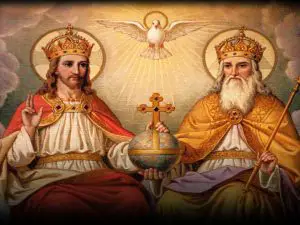 According to Trinitarians, the God of Creation is a triune being consisting of three persons that exist in one God-essence. However, this seemingly foundational truth is never articulated in Scripture.[3] Undaunted by this glaring omission, orthodoxy further instructs us that each member of the three-person God (Father, Son, and Holy Spirit) had a hand in forming Creation. The following verse is often cited as Scriptural proof:[4]
According to Trinitarians, the God of Creation is a triune being consisting of three persons that exist in one God-essence. However, this seemingly foundational truth is never articulated in Scripture.[3] Undaunted by this glaring omission, orthodoxy further instructs us that each member of the three-person God (Father, Son, and Holy Spirit) had a hand in forming Creation. The following verse is often cited as Scriptural proof:[4]
Genesis 1:26 (NASB) Then God said, “Let Us make man in Our image, according to Our likeness; and let them rule over the fish of the sea and over the birds of the sky and over the cattle and over all the earth, and over every creeping thing that creeps on the earth.” (emphasis added)
The use of the plural pronouns us and our are said to refer to the Trinity. However, even Trinitarian scholars admit that the pronouns do not refer to a triune God, but rather to God and His angelic court. For example, Gordon J. Wenham, in his Word Biblical Commentary on Genesis, writes:
From Philo onward, Jewish commentators have generally held that the plural [us, our] is used because God is addressing his heavenly court, i.e., the angels (cf. Isa. 6:8).[5]
Wenham reveals that this view changed in the second century with the advent of certain Church Fathers when he writes:
From the Epistle of Barnabas and Justin Martyr, who saw the plural as a reference to Christ, Christians have traditionally seen this verse as foreshadowing the Trinity.[6]
Wenham powerfully concludes that “It is now universally admitted that this was not what the plural meant to the original author.” [7] (emphasis added) In other words, there was a time when the second century Church Fathers deviated from the original Biblical interpretation of Genesis 1:26. Wenham notes today’s scholarship has corrected the errant course.[8]
Who did the Jews believe God to be?
The Jews, being strict monotheists, understood the one God to be the Father:
Isaiah 64:8 (NASB) But now, O LORD, You are our Father, we are the clay, and You our potter; and all of us are the work of Your hand. (emphasis added)
John 8:41 (NASB) “You are doing the deeds of your father.” They said to Him, “We were not born of fornication; we have one Father: God.” (emphasis added)
John 8:54 (NASB) Jesus answered, “If I glorify Myself, My glory is nothing; it is My Father who glorifies Me, of whom you say, ‘He is our God’ (emphasis added)
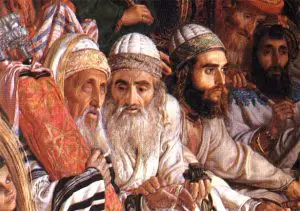 Furthermore, they also understood God the Father to be the Creator. We see this belief firmly reflected in the preaching and teaching of the early Church. For example, after Peter and John were released from prison, they gathered with fellow believers and prayed to God:
Furthermore, they also understood God the Father to be the Creator. We see this belief firmly reflected in the preaching and teaching of the early Church. For example, after Peter and John were released from prison, they gathered with fellow believers and prayed to God:
Acts 4:23-24 and 27-28 (NASB) When they had been released, they went to their own companions and reported all that the chief priests and the elders had said to them. 24 And when they heard this, they lifted their voices to God with one accord and said, “O Lord, it is You who have made the heaven and the earth and the sea, and all that is in them…27 “For truly in this city there were gathered together against Your holy servant Jesus, whom You anointed, both Herod and Pontius Pilate, along with the Gentiles and the peoples of Israel, 28 to do whatever Your hand and Your purpose predestined to occur. (emphasis added)
These Jewish believers addressed their prayer to God, the One “who made the heaven, the earth and the sea, and all that is in them.” It’s important to note that they differentiated between God, who is the Creator, and His servant Jesus. More specifically, they did not ascribe credit to Jesus for any portion of Creation.
In addition, when the apostle Paul addressed the Athenians on Mars Hill, he preached that God was the Creator while Jesus was the man whom He raised from the dead and appointed judge:
Acts 17:24-25 and 30-31 (NASB) “The God who made the world and all things in it, since He is Lord of heaven and earth, does not dwell in temples made with hands; 25 nor is He served by human hands, as though He needed anything, since He Himself gives to all people life and breath and all things…30 “Therefore having overlooked the times of ignorance, God is now declaring to men that all people everywhere should repent, 31 because He has fixed a day in which He will judge the world in righteousness through a Man whom He has appointed, having furnished proof to all men by raising Him from the dead.” (emphasis added)
Paul’s understanding of the Creator is in agreement with that of the Jewish believers in Jerusalem. Furthermore, Paul taught this same belief to other members of the early Church. For example, in Ephesians 1:17, Paul says that God is “the God of our 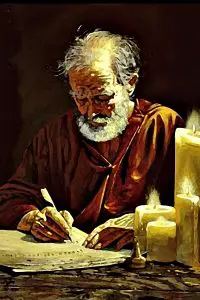 Lord Jesus Christ, the Father of glory.” (emphasis added) Later, in the same epistle he says that this God (of Jesus) is the Creator:
Lord Jesus Christ, the Father of glory.” (emphasis added) Later, in the same epistle he says that this God (of Jesus) is the Creator:
Ephesians 3:9-11 (NASB) and to bring to light what is the administration of the mystery which for ages has been hidden in God who created all things; 10 so that the manifold wisdom of God might now be made known through the church to the rulers and the authorities in the heavenly places. 11 This was in accordance with the eternal purpose which He carried out in Christ Jesus our Lord (emphasis added)
For Paul, God the Father is the Creator while Jesus is the human Christ.
Peter reiterated his belief about the Creator’s identity in his first epistle. He writes that not only is God the Father of Jesus, He is also the God of Jesus.[9] The apostle then goes on to identify God (who is the Father) as a faithful Creator:
1 Peter 4:19 (NASB) Therefore, those also who suffer according to the will of God shall entrust their souls to a faithful Creator in doing what is right.
The Testimony of Heavenly Beings
The twenty-four elders surrounding God’s throne concur:
Revelation 4:9-11 (NASB) And when the living creatures give glory and honor and thanks to Him who sits on the throne, to Him who lives forever and ever, 10 the twenty-four elders will fall down before Him who sits on the throne, and will worship Him who lives forever and ever, and will cast their crowns before the throne, saying, 11 “Worthy are You, our Lord and our God, to receive glory and honor and power; for You created all things, and because of Your will they existed, and were created.”
Notice that the living creatures give glory, honor and thanks to God alone as the Creator. The use of singular personal pronouns he, him, you and your further emphasize the heavenly beings are referring to one person and not a Trinity. [10]
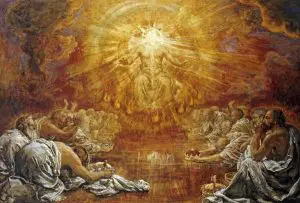
Of great significance is the fact that Jesus is never worshiped as God or the God of Creation. Rather he is said to be worthy because he is the Lamb who purchased men for God (i.e., not for himself). Once again, there is no mention of Jesus’ participation in the creation of the world:
Revelation 5:8-9 (NASB) When He had taken the book, the four living creatures and the twenty-four elders fell down before the Lamb, each one holding a harp and golden bowls full of incense, which are the prayers of the saints. 9 And they *sang a new song, saying, “Worthy are You to take the book and to break its seals; for You were slain, and purchased for God with Your blood men from every tribe and tongue and people and nation.” (emphasis added)
The heavenly beings then announce what Jesus will receive for his sacrificial obedience:
Revelation 5:12-14 (NASB) saying with a loud voice, “Worthy is the Lamb that was slain to receive power and riches and wisdom and might and honor and glory and blessing.” 13 And every created thing which is in heaven and on the earth and under the earth and on the sea, and all things in them, I heard saying, “To Him who sits on the throne, and to the Lamb, be blessing and honor and glory and dominion forever and ever.” 14 And the four living creatures kept saying, “Amen.” And the elders fell down and worshiped. (emphasis added)
If Jesus is God, how is that he will receive power, riches, wisdom and might? As deity, especially as the Creator of all things, these would inherently belong to him. However, if Jesus is the human Messiah, as Scripture teaches, this passage is easily understood to mean he is given these things for his obedience to do the will of God. Furthermore, notice in verse 13 that every created thing makes a distinction between God who sits on the throne and the Lamb. Both are worshiped (the Greek here is proskuneô, and it means to do reverence, to bow down), but only God is worshiped as God who is the Creator. Theologian Emil Brunner explains:
God alone is the Creator,…the Son is called simply and solely the mediator of the Creation. In the New Testament the Son, or Jesus Christ, is never called the Creator. The title is given to the Father alone.[11] (emphasis added)
What did Jesus believe?
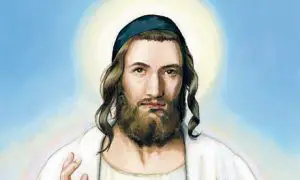
Jesus is decidedly Jewish. As such, he is a monotheist in the Biblical sense of the word. When he prayed to the Father, he called Him the “only true God,” while he identified himself as the Christ whom the one God sent.[12] In addition, when Jesus was asked what the foremost commandment was, he began his answer by reciting his creed, that is, the Shema:
Mark 12:28-29(NASB) One of the scribes came and heard them arguing, and recognizing that He had answered them well, asked Him, “What commandment is the foremost of all?” 29 Jesus answered, “The foremost is, ‘Hear O Israel! The LORD our God is one Lord…'” (emphasis added)
Who does Jesus say is the Creator? If he were part of a triune being that created or co-created all things, we would expect him to say as much. However, each time Jesus speaks of Creation, he credits the only true God, whom he declares to be the Father, with the miraculous feat:
Matthew 19:4-6 (NASB) And He [Jesus] answered and said, “Have you not read that He [God] who created them from the beginning made them male and female, 5 and said, ‘For this reason a man shall leave his father and mother and be joined to his wife, and the two shall become one’? 6 “So they are no longer two, but one flesh. What therefore God has joined together, let no man separate.” (emphasis added)
Jesus gives God the credit for creating mankind. The Christ does not say “we” who created them, but “He who created them.” If Jesus was the Creator, this statement would be disingenuous at best and an outright lie at the worst.
In addition, Jesus further credits the Father for sending rain and for creating the sun, which he refers to as “His sun,” that is, the Father’s sun:
Matthew 5:45 (NASB) so that you may be sons of your Father who is in heaven; for He causes His sun to rise on the evil and the good, and sends rain on the righteous and the unrighteous. (emphasis added)
What’s more, Jesus says it is God who is responsible for Creation, this time in clothing the grass of the field and humanity:
Matthew 6:30 (NASB) “But if God so clothes the grass of the field, which is alive today and tomorrow is thrown into the furnace, will He not much more clothe you? You of little faith! (emphasis added)
Lastly, Jesus speaks of God as being the one who was active at Creation, an obvious reference to Genesis chapter 1. He makes no mention of himself or the so called third member of the Trinity:
Mark 13:19 (NASB) 19 “For those days will be a time of tribulation such as has not occurred since the beginning of the creation which God created until now, and never will.
Conclusion
The monotheistic Jews believed God to be the Father. Furthermore, they believed the Scriptures, which said that God made all things by Himself and that He “alone” formed Creation. They had no concept of a triune God, which was a post-Biblical development that was not made an official dogma until 381 AD.[13] Therefore, let us affirm what the Jews and Jesus believed and what God Himself declared:
Isaiah 45:18 (NASB) For thus says the LORD [Yahweh], who created the heaven (He is the God who formed the earth and made it, He established it and did not create it a waste place, but formed it to be inhabited), “I am the LORD, and there is none else. (emphasis added)
[1] Reuven Hammer, “Tradition Today: A Jewish Creed,” The Jerusalem Post, 12-04-08, accessed 10-14-19, https://www.jpost.com/Jewish-World/Judaism/Tradition-Today-A-Jewish-creed
[2] LORD in all capital letters is the designation for YHWH (Yahweh), God’s covenant name. It is capitalized so as to distinguish from “Lord” which is the English translation of the Hebrew adonai, used to refer to God.
[3] Professor of Theology, A.T. Hanson, states: “No responsible New Testament scholar would claim that the doctrine of the Trinity was taught by Jesus, or preached by the earliest Christians, or consciously held by any writer of the New Testament. It was in fact slowly worked out in the course of the first few centuries in an attempt to give an intelligible doctrine of God.” Anthony Tyrrell Hanson, The Image of the Invisible God, (London: SCM Press, 1982), p.87
[4] Other verses that are used to support the notion that Jesus is the Creator include: John 1:1-3. A three part examination can be found here: Part 1, Part 2, Part 3. Also, Colossians 1:15-18 and Hebrews 1:-2 and 1:3-4 are also shown to be in complete harmony with our findings here.
[5] Gordon Wenham, Word Biblical Commentary on Genesis, (Word Books, 1987), p. 27
[6] Ibid.
[7] Ibid.
[8] For a more detailed defense of this passage, Sir Anthony Buzzard notes: ” No argument can be built for plurality in the Godhead from the plural ending on Elohim (God). Moses, who is a single person, is called Elohim (Ex. 7:1). The Messiah is called Elohim (Ps. 45:6; Heb. 1:8). Note that the Greek version of the Old Testament and the New Testament always render the word God by theos which is a singular, not plural, word. In Judges 8:33; 16:23-24, a single idol is called Elohim. In 1 Kings 11:33 Ashtoreth, the goddess of the Zidonians, Chemosh, the god of the Moabites, and Milcom, the god of the Ammonites, are each designated Elohim, though each was a single god. Furthermore, Abraham is called “lord,” where a plural form, adonim (“lords”), is used (Gen. 24:9-10). Potiphar is called the adonim (“masters”) of Joseph (Gen. 39:2, 3, 7, 8, 19, 20) and the “lords” of Joseph in Genesis 39:16 and 40:7. Joseph is called the man who is the “lords” (adonim) of the land and the “lords” of the country (Gen. 42:30, 33) . Other examples of a plural ending with singular meaning may be found in Num. 25:1-5; Deut. 4:7; 1 Sam. 4:5-8; 1 Kings 11:5; 2 Kings 1:2; 19:37.” As quoted in “God, the Father, the Sole Creator of Heaven and Earth,” Restoration Fellowship, Focus on the Kingdom, http://www.focusonthekingdom.org/creator.htm
[9] 1 Peter 1:3 (NASB) Blessed be the God and Father of our Lord Jesus Christ…
[10] In addition to “Him” being a reference to a singular person, the pronoun “You” here is also a singular pronoun that refers to one person. It is not the plural form of “you.”
[11] Emil Brunner, The Christian Doctrine of God, Dogmatics, Vol. 1 (Philadelphia: The Westminster Press, 1949), p. 232.
[12] John 17:1 and 3 (NASB) Jesus spoke these things; and lifting up His eyes to heaven, He said, “Father, the hour has come; glorify Your Son, that the Son may glorify You…3 “This is eternal life, that they may know You, the only true God, and Jesus Christ whom You have sent.
[13] Council of Constantinople.
